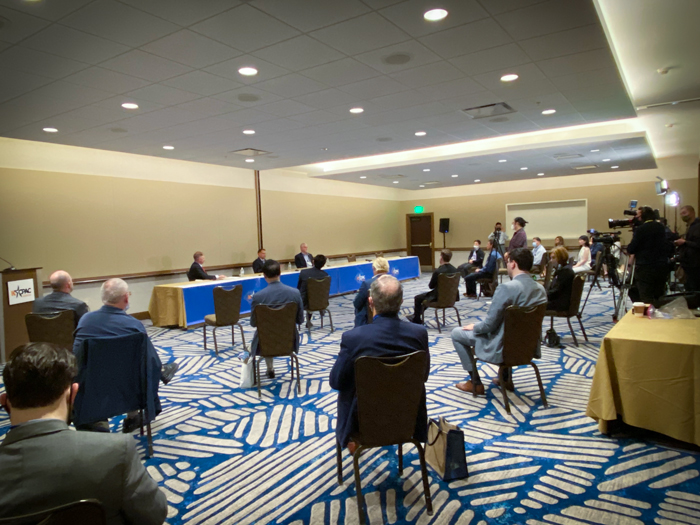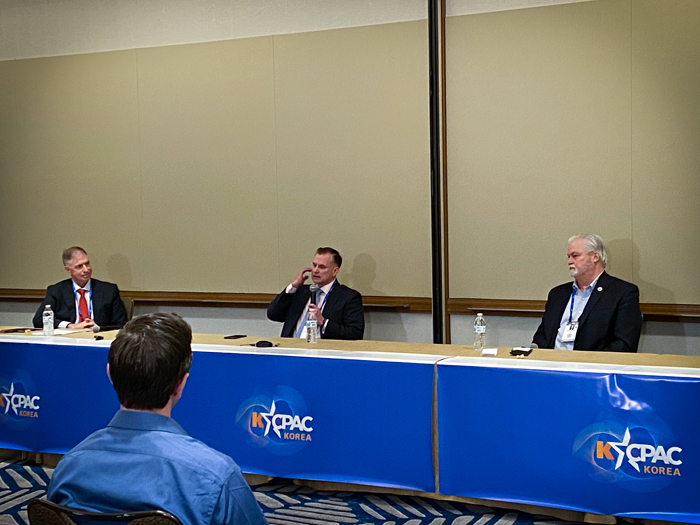CPAC/KCPAC 2021 Breakout Session
“China Subverts America: Winning Without Fighting”
Panelists:
Brig. Gen. Robert Spalding, USAF (retired), former US National Security Council official, and author of Stealth War: How China Took Over While America’s Elite Slept
Charles “Sam” Faddis, retired CIA officer and expert in Chinese Communist subversion
Grant Newsham (moderator), author of Fraud in the South Korea April 15, 2020 election: It probably did happen, and is a big deal for the United States
Center for Security Policy, Asia security analyst
President of KCPAC
This panel focused on the nature and scope of Communist China’s subversive activities and influence operations within the United States and some possible countermeasures by America’s elite political, business and academic circles being targeted by China.
Gen. Spalding noted that although some had thought that the modern global trends of democracy, rule of law, free trade, and openness would bring about positive reforms in China’s political system, the Chinese Communist Party has, on the contrary, been using these solely as weapons to negatively influence people’s hearts and minds and to undermine free societies.
Mr. Faddis described Chinese espionage and subversive operations against the U.S. as nothing particularly new, except with regard to the technologies used, but that a major problem has been our allowing such influence activities to run rampant in our country, due to a lack of sufficient counter-intelligence efforts. He added that because of our close economic ties to China, we do not perceive them as being as much of a threat to us as we did with regard to the former Soviet Union. He warned that we are not aware of the full scope of China’s penetration of the U.S. and how many Americans they have been able to recruit, due to their freedom to function here.
Mr. Newsham remarked that his experience working for financial firms taught him that the Chinese market has no reliable legal system, corruption and dishonesty are rampant, statistics and other figures are entirely unreliable, and investments in China are allowed solely at the whim of the Chinese Communist Party, but due to the allure of money, the Chinese have essentially been able to “buy off” the vast majority of America’s financial circles.
Gen. Spalding mentioned the case of an employee of the Marriott hotel company who after Tweeting about human rights abuses by China in Tibet was fired by Marriott due to pressure exerted on the company by the Chinese Communist Party, which closely monitors social media. He also noted that a manager of the Houston Rockets basketball team was nearly fired for Tweeting in support of pro-democracy forces in Hong Kong. Apple corporation, he added, was also an example of Chinese influence over American businesses. He said that since Apple products are manufactured in China, they were compelled to remove certain apps and provide access to iCloud data of users to the Chinese authorities. He added that much of the information included in investment promotional materials sent by financial advisors to American pension fund managers is provided by Chinese Communist Party members at Hong Kong firms. Our nation’s academia, and its legal, corporate, financial and political systems are all tied to the Chinese Communist Party and therefore incentivized to meet any demands of the Party.
Mr. Faddis stressed that it was important to understand that China applies a “whole of government” approach to its subversion and other influence activities in the U.S. and that Americans are being recruited, co-opted, and influenced to serve China’s interests. He pointed out that this occurs through virtually every point of contact with China, and noted by way of example that seemingly almost every month, another professor, researcher or other academic is being arrested or investigated for crimes such as passing along classified information to China or failing to disclose funding from China. He concluded that these public cases must be only a small percentage of the number of individuals who have actually been recruited or co-opted by China, but who have not yet been exposed, and that the current U.S. administration has been nominating, for cabinet level positions, individuals who have had extensive ties to the Chinese Communist Party. The new Secretary of State, he noted, was involved with a supposedly academic institution which was actually a propaganda arm of the Party, and the new U.N. Ambassador had given a speech praising China’s role in Africa. He pointed out that the threat we face is not simply an emerging one, but rather one which we face now, and which has been allowed to continue for so long that it is hard to assess how deep the penetration has been.
Mr. Newsham revealed that from his own experience, he has seen there has even been self-censorship, and a fear of in any way offending China, within the U.S. Marine Corps, which he described as a pernicious kind of phenomenon almost psychological in nature.
Gen. Spalding disclosed that in the process of briefing senior level U.S. military commanders, as well as officials of other government departments and agencies, regarding Chinese subversion and influence operations here, he found that for many years there was a lack of serious attention to such problems or willingness to take strong countermeasures against them. He noted that if the U.S. intelligence community does not talk about a certain problem, then it is essentially deemed not to exist. It has been very difficult, he said, to alert the intelligence community that China is using our own social media, corporations and banks against us.
Mr. Faddis pointed out that we do not have sufficiently detailed intelligence regarding biological weapons labs in China, which is why we are still not completely sure what really happened in terms of the source and spread of the COVID-19 virus. Since biological warfare is at the top of the list of U.S. intelligence priorities, it is incredible that we did not know more about that critical situation.
Gen. Spalding explained that this problem was the result of the fact that because we tend to look at threats almost exclusively in traditional military terms, the non-military types of threats of a political, social, financial, economic nature, posed by the Chinese Communist Party’s activities here, are not sufficiently appreciated, and that intelligence agencies even had to rely on information from the Centers for Disease Control as to what was really going on in Chinese labs. His biggest struggles with the intelligence community, he said, involved getting them to focus on the activities of the Chinese Communist Party.
In terms of what damage is caused by Chinese subversion, Gen. Spalding stressed that the damage has been to our freedoms, as evidenced by how we have had to change our lifestyles due to the COVID-19 pandemic, and that a clear and present danger is posed by the Chinese Communist Party’s political warfare against the U.S. As another example of this, he cited the Party’s infiltration of and influence within the medical establishment in the U.S. and around the world. He added that political warfare is often based on greed and fear, and that he believed that Chinese political influence was behind the exaggerated claims made by the Imperial College of London with regard to early predictions of several millions of COVID-19-related deaths in the U.S. Even U.S. medical policy, he said, is being influenced to a degree by China’s Communist Party. The damage that the Party has done to America, he reiterated, was on full display in what had happened to the U.S., to American society, during 2020.
Mr. Faddis described how U.S. traditional industries had been devastated by China’s economic warfare and American elites who pursued mistaken political and economic policies.
Gen. Spalding explained that national security and sovereignty have been eroded by China’s activities, and that although U.S. military capabilities in the Pacific region have also been eroded, what he really fears most is certainly not any Chinese military invasion, but rather what is happening domestically in the U.S., especially with regard to American being persuaded to give up some of their freedoms, based in part on Chinese influence on our political and economic policies. Big tech companies, he believes, are helping transform the U.S. into an authoritarian nation, based on a Chinese model. He said that China, by controlling data, which is the fuel of artificial intelligence, seeks to shift our perceptions and eventually also our policies.
Mr. Faddis warned that as we continue on our current path, with the Chinese being so successful in their efforts, there is a real possibility that we may become involved in a limited military conflict with China, which does not approach the level of a catastrophic world war, but which would compel us to decide whether to adapt ourselves to a new and diminished strategic position or to make a national effort to engage in full-scale war.
Gen. Spalding commented that he tends to doubt the probability of war with China due to the existence and deterrent effect of nuclear weapons, and particularly because the Chinese Communist Party would not want to see the destruction of all the infrastructure it had built up within China. He repeated that a greater concern for him is the slow erosion of democratic principles in the U.S. and other free nations, which is advantageous to China. In this regard, he mentioned China’s anti-democratic “social credit system” used to control its population, and how American big tech companies appear to be going down the same path by starting to define what is acceptable behavior of Americans and to systematically exclude some of them from services.
China, he fears, will increasingly use big data for social and political control not only at home, but also abroad. Since the Chinese Communist Party’s greatest fear is the spread of democratic principles among its population, he believes that in order to maintain its monopoly of power, the Party seeks to suppress such principes not only within China, but everywhere.
Gen. Spalding explained that a countermeasure to these Chinese efforts is to enhance data security and privacy. A space must be created, he said, for citizens of free societies to prevent their data from being used against their own interests.
Mr. Faddis said that he believes that countermeasures must ultimately be in the political realm, since the American people were deceived into believing that China would democratize and that we would benefit from embracing Communist China, and also because many people with large amounts of money and influence in the U.S. have an economic interest in preventing any change of course in U.S. policy toward China. He believes that although most Americans have now awakened to the threat posed by China, it is now a matter of political will to make the necessary policy changes. He remarked that he thinks we were headed in the right direction during the previous U.S. administration, but that this may unfortunately change under the current administration.
Mr. Newsham observed, in conclusion, that he also thought that the previous U.S. administration had done a good job of not only identifying the threats we face from China, but also in acting to counter such threats, but he is not sure that will continue.




